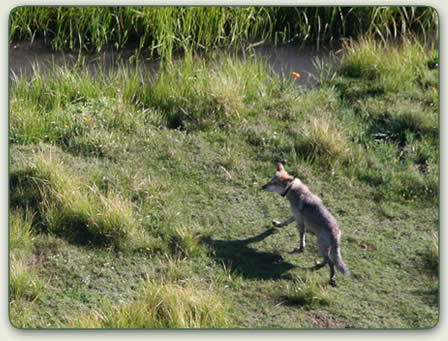29
Oct
Press Release: Mexican Wolf Release Proposal Falls Short
PRESS RELEASE
For Immediate Release: October 29, 2012

Contact for Media:
Russell Winn, Ph.D., President, Board of Directors, White Mountain
Conservation League: 928.339.4684, ruwinn@nmsu.edu
Sandy Bahr, Chapter Director, Sierra Club – Grand Canyon Chapter: 602.
253.8633, sandy.bahr@sierraclub.org
Emily Nelson, Program Director, Grand Canyon Wolf Recovery Project,
928-202-1325, emily@gcwolfrecovery.org
Nutrioso, AZ – On Saturday, October 27, twenty-two scientists, conservation advocates, and concerned citizens sent comments to the U.S. Fish and Wildlife Service telling the agency a new proposal to release wolves into the wild from captivity highlights essential changes needed in the Mexican wolf reintroduction program. The letter, written in response to a draft Mexican wolf “Replacement Release Outline for Arizona 2013,” states that although the release of new wolves after four years with no new releases is needed, the proposed plan is inadequate to boost the wild population, last counted at only 58, and threatens to bring back a management policy that resulted in the death or removal of 92 wolves before it was rescinded in 2009.
According to Russell Winn, Mexican wolf reintroduction area resident and president of the White Mountain Conservation League, “The release proposal shows a disturbing lack of commitment to recovery. The wild population of Mexican wolves is at tremendous risk due to its small size and genetics and the agency managing the program is proposing to address this by putting out one or two more wolves within or next to existing wolves’ territories, and killing or removing them if they become a ‘nuisance’.”
Winn and the letter’s other signers are urging the Fish and Wildlife Service to instead implement several steps they say are critical to rescue the wolves’ genetics and grow the wild population at the necessary rate.
Sandy Bahr, Chapter Director for the Sierra Club – Grand Canyon Chapter, called the proposal “woefully inadequate,” saying, “For the program to work, they need an aggressive genetic rescue and release plan that frees many more wolves; they need to change the rules so wolves can be released anywhere within the Blue Range Wolf Recovery Area, not just in a limited area in Arizona; they need to consider all parts of the recovery area potentially suitable for wolf releases regardless of livestock grazing patterns; and they have to expedite completion of the long-awaited recovery plan for the Mexican gray wolf.”
The letter also urged that decision authority for wolf release decisions be restored to the Fish and Wildlife Service as has been ordered by a federal court.
Emily Nelson, Program Director for the Grand Canyon Wolf Recovery Project said, “When we get a proposal like this that is written to accord with a directive from the Arizona Game and Fish Commission to accept releases only to replace wolves illegally killed in Arizona the previous year, and the Pack Management Plan that accompanies the proposal is based on assurances made by the Service to the Arizona Game and Fish Department, and AZ Game and Fish is leading the public outreach, it’s pretty clear that the Fish and Wildlife Service is not taking responsibility for making decisions based on the welfare of the wolves.”
###
Please contact the US Fish and Wildlife Service today and tell them to release wolves in the right way, with rules that will truly promote the recovery of the Mexican wolf wild population. Here is a sample email to send to USFWS Southwest Regional Director Ben Tuggle:
1. While proposing to release a few new wolves into the wild after four years of no releases is a step in the right direction, the Mexican Wolf Blue Range Reintroduction Project Replacement Release Outline for Arizona 2013 is inadequate.
1. While proposing to release a few new wolves into the wild after four years of no releases is a step in the right direction, the Mexican Wolf Blue Range Reintroduction Project Replacement Release Outline for Arizona 2013 is inadequate.
2. The resumption of killing and removing endangered Mexican wolves over livestock conflicts outlined in the Pack Management Plan is unacceptable. Policies like those described in the plan are one of the reasons the Mexican wolf population numbers and genetic health are still of such great concern.
3. If the Mexican gray wolf is going to succeed, several critical steps must be implemented immediately:
- Develop, adopt, and implement an aggressive genetic rescue/re-rescue plan;
- Revise the Endangered Species Act Section 10(j) rule to authorize direct releases of captive-raised Mexican wolves to any geographic location within the designated BRWRA (currently new wolves can only be released into Arizona, which excludes excellent habitat in New Mexico);
- Restore decision authority to the USFWS for wolf release decisions (this release proposal came from the AZ Game and Fish Department, and is clearly written to accord with a directive from the Arizona Game and Fish Commission to accept releases only to replace wolves illegally killed in Arizona the previous year);
- Eliminate “presence of livestock” as a rationale for excluding areas from consideration for wolf releases (There are plenty of places to release wolves in the Blue Range Wolf Recovery Area, but many appear to be excluded simply because of active livestock grazing operations in the project area; proactive measures have been successfully used to avoid depredations and the recovery of Mexican gray wolves is the appropriate priority); and
- Resume and expedite recovery planning for the Mexican gray wolf (The recovery planning process for the Mexican wolf is currently stalled and significantly behind schedule. At this point, the release of a draft Recovery Plan is not expected until sometime in 2014. Mexican wolves need and deserve better performance by the USFWS).
Please add anything else you would like, and include your name and address with your comments.
For more information on the proposal, click here.
Click here to join our email list for Mexican wolf news and action alerts.



